Wikipedia:Picture of the day/March 2010
|
Featured picture tools: |
These featured pictures, as scheduled below, appeared as the picture of the day (POTD) on the English Wikipedia's Main Page in March 2010. Individual sections for each day on this page can be linked to with the day number as the anchor name (e.g. [[Wikipedia:Picture of the day/March 2010#1]] for March 1).
You can add an automatically updating POTD template to your user page using {{Pic of the day}} (version with blurb) or {{POTD}} (version without blurb). For instructions on how to make custom POTD layouts, see Wikipedia:Picture of the day.Purge server cache
March 1
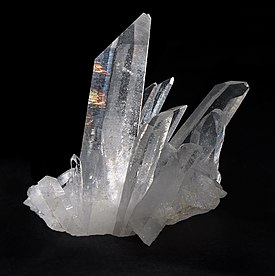
|
A quartz crystal cluster from Tibet. Quartz is the second-most abundant mineral in the Earth's continental crust, after feldspar. There are many different varieties of quartz, several of which are semi-precious gemstones. Pure quartz, traditionally called rock crystal (sometimes called clear quartz), is colorless and transparent (clear) or translucent. Common colored varieties include citrine, rose quartz, amethyst, smoky quartz, milky quartz, and others. Photo credit: Noodle snacks
Recently featured:
|
March 2

|
|
An aerial panoramic view of Port Vell, Barcelona, Spain, from atop the Columbus Monument. The area has been in use as a port since the 4th century BC, when it was settled by the Laietani. The current incarnation was built as part of an urban renewal program prior to the 1992 Barcelona Olympics. It is now a focal point of the city and tourist attraction, drawing up to 16 million visitors a year. Photo credit: David Iliff
Recently featured:
|
March 3

|
A poster advertising a ca. 1896 American production of Georges Bizet's opéra comique Carmen, which premiered in Paris on March 3, 1875. Although it was initially quite unsuccessful, a second production in October 1875 after Bizet's death achieved critical and commercial success. Since then, it has been one of the world's most performed operas. Based on the novella of the same title by Prosper Mérimée, Carmen, with its alternating comic or sentimental scenes found traditionally in opéra comique with stark realism, virtually eliminated the opéra comique genre and nourished the verismo movement in opera. Poster: Liebler & Maass; Restoration: Adam Cuerden
Recently featured:
|
March 4

|
The Lotus-Namam is the symbol of Ayyavazhi, a Dharmic belief system that originated in South India in the 19th century. The lotus represents the 1,008-petalled Sahasrara and the flame-shaped white Namam represents the Aanma Jyothi or ātman, sometimes translated as 'soul' or 'self'. The number of practitioners is estimated to be between 700,000 and 8,000,000, although the exact number is unknown, since Ayyavazhis are reported as Hindus during censuses. Image credit: Vaikunda Raja
Recently featured:
|
March 5

|
"Know all men by these presents" is the title of this drawing by Coles Phillips (1880–1927), which served as the cover of a 1910 issue of the original incarnation of Life. Phillips' signature technique was the "fadeaway girl", demonstrated here, in which he would combine foreground and background elements of the same color, giving the impression of negative space. This style became a popular convention in print art for decades to come. Coles was hired by Life at the age of 26, and he remained associated with the magazine for his entire life. Restoration: Lise Broer
Recently featured:
|
March 6

|
|
A Granny Smith apple and the cross-section of another. This cultivar originated in Australia in 1868 from a chance seedling propagated by Maria Ann Smith (1799–1870), from whom comes the name. Granny Smith apples are crisp, juicy, tart apples which are often used for cooking, especially in salads because the slices do not brown as quickly as other varieties. Photo credit: Fir0002
Recently featured:
|
March 7

|
False-colour scanning electron micrograph of the coccolithophore Gephyrocapsa oceanica, showing the calcareous coccoliths (plates or scales composed of calcium carbonate) on the surface that give the group its name. Coccolithophores are single-celled algae, protists and phytoplankton found throughout the photic zone of the ocean. This specimen is approximately 8 µm in diameter. SEM: NEON; Colouring: Richard Bartz
Recently featured:
|
March 8

|
The yellow fever mosquito (Aedes aegypti) is a species of mosquito known for its ability to spread yellow fever and dengue fever. The mosquito can be recognized by the white markings on its legs and a marking in the form of a lyre on its thorax. Though originally from Africa, the yellow fever mosquito can now be found in tropical regions around the world. Photo credit: Muhammad Mahdi Karim
Recently featured:
|
March 9
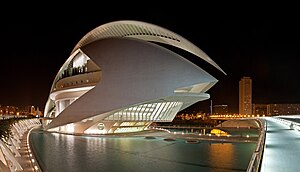
|
The Queen Sofia Palace of the Arts (Valencian: Palau de les Arts Reina Sofía) is an opera house located in Valencia, Spain. The last to be completed of the City of Arts and Sciences complex, it was designed by architect Santiago Calatrava. The 14-story structure opened on 8 October 2005. Photo credit: David Iliff
Recently featured:
|
March 10
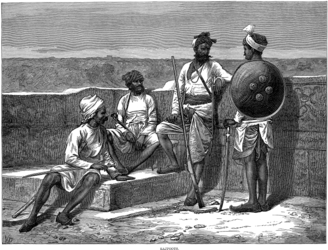
|
An 1876 engraving of Khokar Rajputs of Punjab. The Rajputs are one of the major Hindu Kshatriya (warrior) groups of India. Rajputs rose to prominence during the 9th to 11th centuries, and by the time of Indian independence, they ruled more than two-thirds of the estimated six hundred princely states, including three-quarters of the salute states. Image: The Illustrated London News
Recently featured:
|
March 11
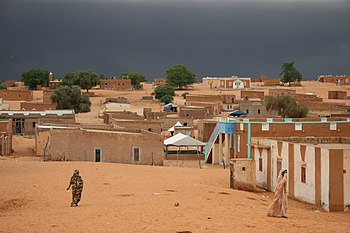
|
A view of rainclouds gathering over Bareina, a Bedouin village and rural commune in the Trarza Region of southwestern Mauritania. Photo credit: Ferdinand Reus
Recently featured:
|
March 12
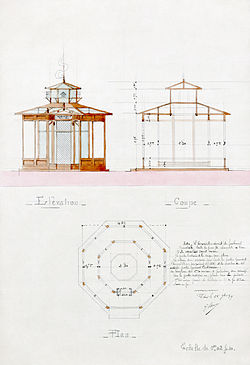
|
A ca. 1889 proposed architectural plan for a military aviary to house swallows as messenger birds, based upon a scheme by Jean Desbouvrie, a French amateur bird trainer who successfully demonstrated that swallows could exhibit homing behavior and that when they did so they flew much faster than carrier pigeons. Furthermore, swallows fly higher and faster than pigeons, are more difficult for marksmen to shoot or for birds of prey to intercept, and are able to feed during flight. However, after obtaining authorization from the French government for further testing, Desbouvrie did not follow through with rigorous experimentation, and his plans never came to fruition. Image: F. Meriy; Restoration: Lise Broer
Recently featured:
|
March 13

|
An animated image demonstrating a breeder pattern from Conway's Game of Life. Breeders exhibit quadratic growth, by generating multiple copies of a secondary pattern, each of which then generates multiple copies of a tertiary pattern. There are four types of breeders, this one being a puffer that leaves guns in its wake. Image credit: Chris Benton
Recently featured:
|
March 14

|
Alice B. Woodward's frontispiece to The Story of the Mikado (1921), W. S. Gilbert's last literary work: a posthumously published retelling of the plot of his comic opera The Mikado for children. The Mikado, set in a fictionalised Japan, opened on March 14, 1885, at the Savoy Theatre in London. The locale was chosen merely to provide a picturesque setting and to capitalise on the British fascination with Japan in the 1880s, allowing Gilbert to satirise British politics and institutions more freely by disguising them as Japanese. The Mikado became the most frequently performed Savoy opera, has been translated into numerous languages and is one of the most frequently played musical theatre pieces in history. Restoration: Adam Cuerden
Recently featured:
|
March 15

|
A view across the Sahara with the Acacus Mountains, a mountain range in the desert of western Libya, in the distance. The Acacus Mountains have a large variation of landscapes, from differently coloured sand dunes to arches, gorges, isolated rocks and wadis. The petroglyphs found in the area led it to be declared a World Heritage Site in 1985. Photo credit: Luca Galuzzi |
March 16

|
A salted and roasted pistachio nut with its shell. The modern pistachio nut was first cultivated in Western Asia. Pistachio trees (Pistacia vera) are planted in orchards, and take around seven to ten years to reach significant production. The kernels are often eaten whole and are also used in foods such as ice cream. Photo credit: Muhammad Mahdi Karim
Recently featured:
|
March 17

|
A photochrom print of Patrick Street in Cork, the second-largest city in the Republic of Ireland, ca. 1890–1900. Originally founded as a monastic settlement in the 6th century, Cork is believed to have been an important port city for Vikings. After the Great Irish Famine in the 1840s, Cork became a major point of Irish emigration to North America. Photochrom: Detroit Publishing Co.
Recently featured:
|
March 18

|
The dune stinkhorn (Phallus hadriani) is a species of fungus recognized by its phallic-shaped fruiting body and its pitted and ridged cap. It is distinguished from the common stinkhorn by the pink or violet-colored volva at the base of the stem. As the common name implies, the fungus has a strong odor; some describe it as pleasant, while others find it foetid or putrid. Photo credit: Nathan Wilson
Recently featured:
|
March 19
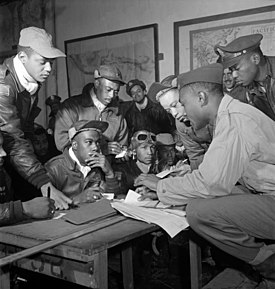
|
A group of African American fighter pilots, popularly known as the Tuskegee Airmen, belonging to the 332d Fighter Group at Ramitelli Airfield, Italy, in May 1945. The Tuskegee Airmen were the first African American military aviators in the United States armed forces. On March 19, 1941, the 99th Pursuit Squadron was activated with over 250 men. This became the core of other black squadrons forming at Tuskegee and Maxwell Fields, all of which combined to form the 332d in 1944. Photo: Toni Frissell; Restoration: Jake Wartenberg
Recently featured:
|
March 20

|
An illustration from a ca. 1916 edition of The Water-Babies, A Fairy Tale for a Land Baby, a children's novel written by Charles Kingsley and originally serialised in 1862–63. The book, a didactic moral fable, tells the story of Tom (lower left), a young boy who drowns and is reincarnated as a "water-baby". He undergoes a series of adventures and eventually regains his human form. It was extremely popular during its day and through the 1920s, but has since fallen out of favour, perhaps due to Kingsley's expression of many of the common prejudices of that time period, such as against Americans, Jews, blacks, and Catholics, particularly the Irish. Illustration: Jessie Willcox Smith; Restoration: ErikTheBikeMan
Recently featured:
|
March 21
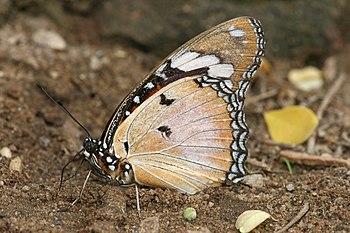
|
The Danaid Eggfly (Hypolimnas misippus) is a widespread species of nymphalid butterfly found throughout the world. It is well known for polymorphism and its mimicry of the African Monarch, a milkweed butterfly that is distasteful to predators, while not being poisonous itself. Photo credit: Muhammad Mahdi Karim
Recently featured:
|
March 22
|
The bathing boxes on Dendy Street Beach in Brighton, Victoria, Australia, with Middle Brighton pier and breakwater and the Melbourne skyline in the background, 12 kilometres (7.5 mi) to the northwest. Originally named Waterville, the community is named after the town of Brighton in England. Brighton houses some of the wealthiest citizens in Melbourne with grand homes, and the development of large residential blocks of land. Photo credit: John O'Neill
Recently featured:
|
March 23
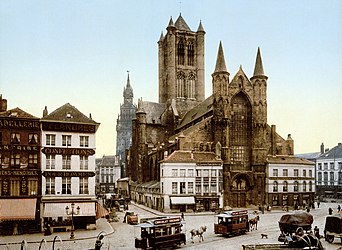
|
A ca. 1890–1900 photochrom print of Saint Nicholas' Church in Ghent, Belgium, one of the city's oldest and most prominent landmarks, dating back to the 13th century. The church's central tower served as an observation tower and carried the town bells until the neighboring belfry of Ghent was built. Photochrom: Detroit Publishing Co.
Recently featured:
|
March 24

|
An image of Daniel O'Connell (1775–1847), captioned "The Champion of Liberty". O'Connell was an Irish political leader in the first half of the nineteenth century. He campaigned for Catholic Emancipation—the right for Roman Catholics to sit in the Westminster Parliament, denied for over 100 years—and repeal of the Act of Union which combined Ireland and Great Britain. King George III had disallowed Catholics from sitting in Parliament, saying that it would breach his coronation oath to act as protector of Protestantism. Through O'Connell's efforts, Catholic Emancipation was finally passed by Parliament on 24 March 1829. Image: Alfred Hoffy; Restoration: Lise Broer
Recently featured:
|
March 25

|
Randy's Donuts is a donut (doughnut) shop in Inglewood, California, known throughout the United States for its novelty architecture, consisting of a 32.5-foot (9.9 m) diameter donut on the roof of an otherwise ordinary drive-through bakery. Randy's was built in 1953, decades after the heyday of such architecture in Southern California, which saw the construction of a number of buildings in the shape of the products they sold. Randy's is one of five remaining locations of the Big Donut chain, each of which features the distinctive giant donut, but Randy's remains the most well-known. Photo credit: Carol M. Highsmith
Recently featured:
|
March 26

|
Tameing a Shrew; or, Petruchio's Patent Family Bedstead, Gags & Thumscrews, an 1815 caricature based on William Shakespeare's 1623 play The Taming of the Shrew. The main plot depicts the courtship of Petruchio, a gentleman of Verona, and Kate, the headstrong, obdurate shrew. Initially, Kate is an unwilling participant in the relationship, but Petruchio tempers her with various psychological torments—the "taming"—until she is an obedient bride. In this cartoon, the husband engages in systematic spousal abuse, going far beyond what was considered acceptable at the time it was published. Cartoon: Charles Williams; Restoration: Adam Cuerden
Recently featured:
|
March 27

|
A farmer and his sons walk through a dust storm in Cimarron County, Oklahoma, United States, during the Dust Bowl period. Between 1930 and 1940, severe drought coupled with decades of extensive farming without crop rotation, fallow fields, cover crops or other techniques to prevent erosion, led to major ecological and agricultural damage to American and Canadian prairie lands. Millions of acres of farmland became useless, and hundreds of thousands of people were forced to leave their homes. Photo: Arthur Rothstein; Restoration: Michel Vuijlsteke
Recently featured:
|
March 28

|
A paper clip on water, which appears blue here due to the colour of the glass, being held up by surface tension. Surface tension also keeps the water from overflowing the glass. It is caused by cohesion (the attraction of molecules to like molecules by various intermolecular forces.). It is what causes the surface portion of liquid to be attracted to another surface, such as that of another portion of liquid. Photo credit: Noodle snacks
Recently featured:
|
March 29
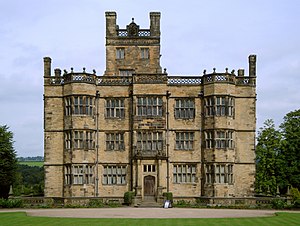
|
The front of Gawthorpe Hall, near Padiham, England. The Elizabethan house dates back to 1600 and was built around a pele tower. In 1850, Sir Charles Barry redesigned the house. Until 1970, Gawthorpe Hall was owned by the Kay-Shuttleworth family. Now owned by the National Trust, the house is open to the public and contains displays of historical artefacts. Photo credit: Childzy
Recently featured:
|
March 30

|
Cubes of pyrite from Ampliación a Victoria Mine in Spain. Pyrite, or iron pyrite, is nicknamed "fool's gold" due to its metallic luster and brass-yellow hue. The most common of the sulfide minerals, pyrite has been used in firearms, the production of sulfur dioxide, radio receivers, and jewellery. The name "pyrite" is derived from the Greek πυρίτης (puritēs), “of fire” or "in fire”, and ancient Romans applied the name to several types of stone that would create sparks when struck against steel. Photo credit: Noodle snacks
Recently featured:
|
March 31
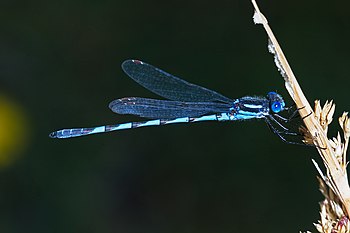
|
The Blue Ringtail (Austrolestes annulosus) is a damselfly widely distributed in most of Australia, except for the northern and northeastern parts. Colour may vary among individuals, but most are a striking blue with minimal black markings. Females are slightly more robust than males, and have a black and white/pale blue colouration. Photo credit: Noodle snacks
Recently featured:
|
Picture of the day archives and future dates

